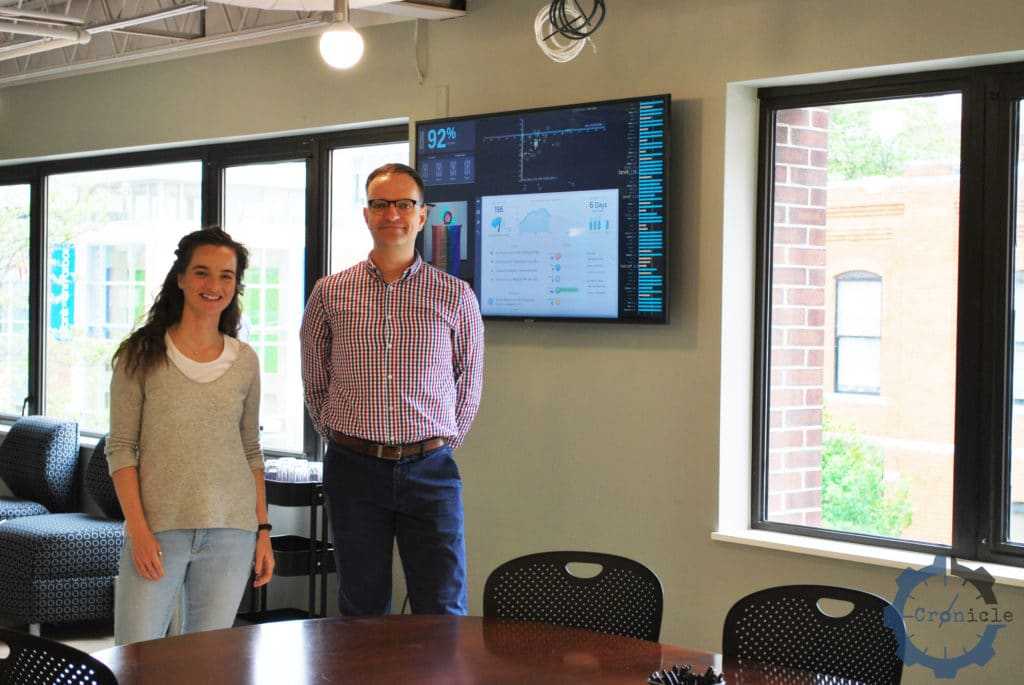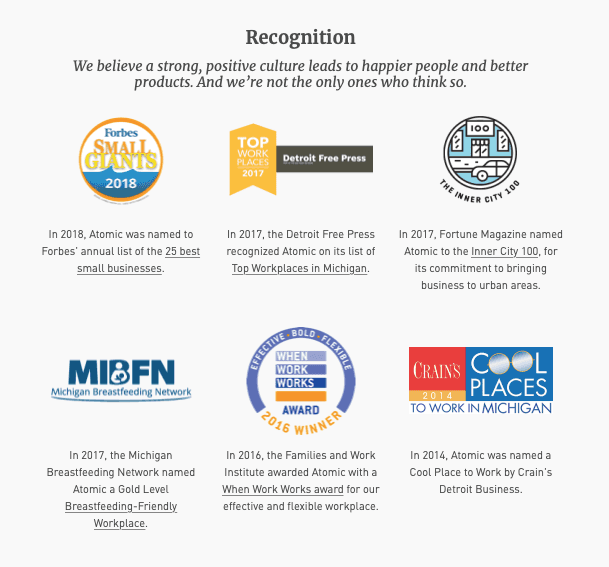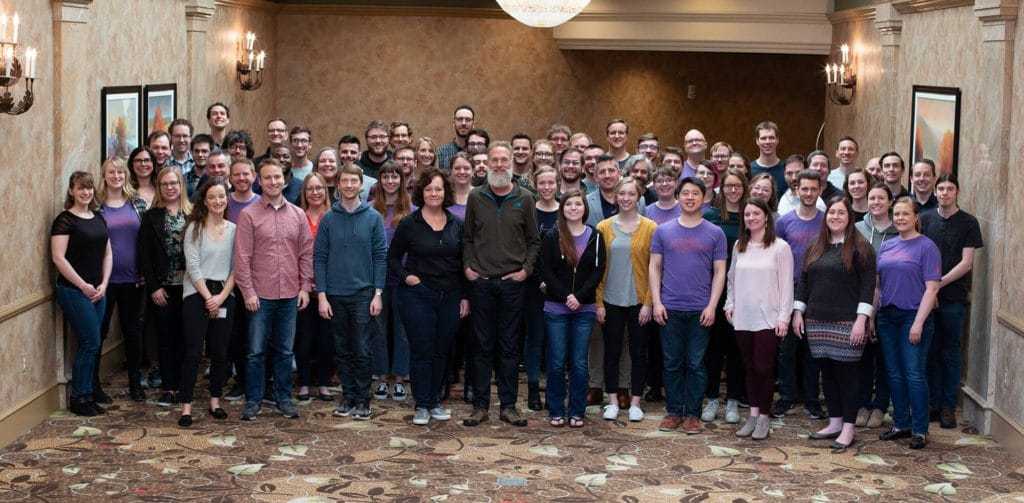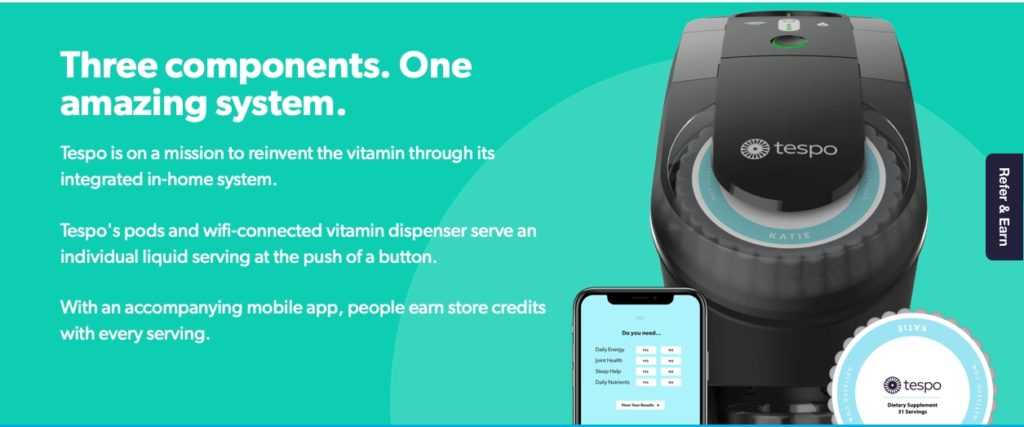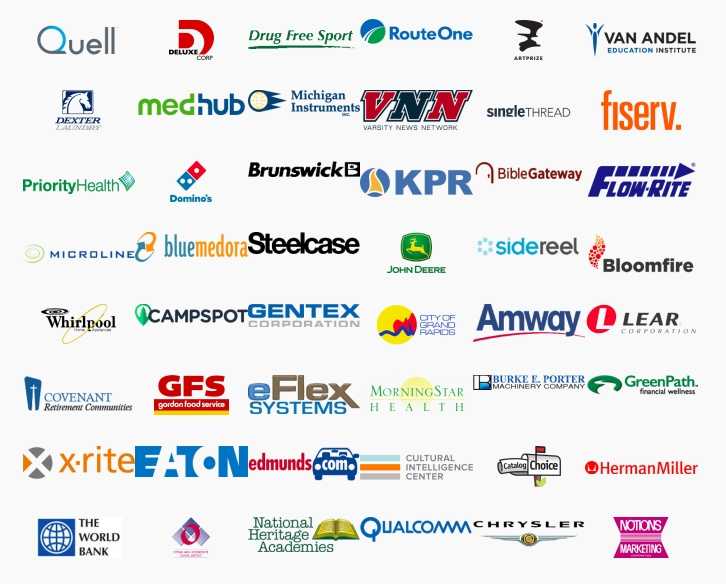Atomic director of marketing Elaine Ezekiel and managing partner Jonah Bailey stand in their conference room on N. Fifth across from the ITHAKA building in Ann Arbor.
In the vein of spotting the reclusive but ubiquitous "tech doors of Ann Arbor," we recently stopped in at Atomic Object, which is hiding in plain sight inside the old Salvation Army building across from ITHAKA on North Fifth. This one you could be forgiven for missing if you haven't been to an event at their offices, because the front door of Atomic Object is inside the front door of the building. And yet, this is a famously great place to work, which has won awards on workplace culture from everyone from Forbes to Crains to Fortune. How does a relatively small software development company from Ann Arbor win awards for its culture and cultivate a reputation for excellence in serving custom software clients?
Atomic director of marketing Elaine Ezekiel met us to talk about what it's like working in a company she first met in her background working in journalism and nonprofits. "I was working in a nonprofit and wrote a grant [for a piece of software]," Ezekiel says. "I was used to software not being invested in social justice work, because it was pretty far afield. When I asked, 'who can build a piece of software for me?' I was concerned about getting a glassy-eyed response."
"In retrospect I see I didn’t have enough money to build custom software, but [Carl Erickson] didn’t make me feel that way,"
Elaine Ezekiel, Director of Marketing Atomic Object
Instead, Atomic Object co-founder and CEO Carl Erickson worked with her on the idea, and Ezekiel said her preconceptions about tech were shattered. "In retrospect I see I didn’t have enough money to build custom software, but he didn’t make me feel that way," she says. "That was my first exposure to what marketing was at Atomic. When [Erickson] said he had an opening for marketing position, Hilary Clinton was coming during her campaign in 2016 for a private town hall meeting at Atomic in Grand Rapids and he invited me there. He jokes that was his recruiting tactic to invite Hilary to get me there."
Atomic Object has won a number of awards for its workplace culture.
That was 3 years ago, and Ezekiel tells us she's grateful for that experience. "I’ve learned a lot about what marketing can be. I can bring core things that are important to me like telling the truth and social justice and coming up in school in journalism.... We’re a 100% employee-owned company. When I want to create compost bins, the next day there are compost bins. There are so many resources in our space. To bring the sensibility of the nonprofit to a place where people are hungry to work for a place they feel good about, that’s an awesome place to be."
"We have a marketing strategy of giving more than we take," Ezekiel says. "It's about giving the right thing when no one’s watching. Not making the decision that’s going to help us in the short term and hurt us in the long term.... We meet and put the most senior people at our company with anyone who wants to see if they might be a good fit for our services. People often don’t realize it costs a fair amount to engage with us, but we always set people in a direction that will help them. They might just not be ready. Maybe in the future they’ll remember us."
Atomic Object founder Carl Erickson pictured center with his entire team in 2019. Marketing manager Elaine Ezekiel pictured front fourth from left. Courtesy photo.
Managing partner Jonah Bailey tells us this culture at Atomic feeds into their strategy for engineering excellence. "Within the Internet of Things space we had an interesting approach in that we tried to spin off our own division of embedded software (low-level software that runs on a chip for devices, with no user interface).... To work in the IoT space you need to develop embedded software. We have electrical engineers on staff who also have traditional software dev skillset. As a company we’ve coalesced around being generalists. We need to be able to do whole thing."
"There are three things we’re better than anybody else at," Bailey says. "One is engineering excellence. Everything we talk about in pair programming et cetera we really do. The second one is we intermesh design and development in combined teams in a way that makes sure we’re building the right thing. If you build things well but you’re building the wrong thing, what value does it have? The third one is our agile process is second to none. It's not the same agile process that’s being used everywhere else. It’s pragmatic and has grown up here over time. It works really well for our teams; it enables design and dev to work together seamlessly.... We’re not an idealistic bunch," Bailey says. "If something ideally should work but it’s not working, we’ll throw it out and we’ll figure out what will work."
"There are three levers we can pull: Money, Quality, Scope. Atomic removes the lever of Quality and operates like that lever doesn’t exist because we don’t believe it’s in anybody’s best interest to compromise on quality."
Jonah Bailey, Managing Partner Atomic Object
Everyone says their agile process is different, but in this case the differences in transparent communication and iterative development process that allows for quick pivots that Bailey laid out seem to be working for clients that range from Whirlpool to Lear.
Bailey says that some customers are feature sensitive, others have a set budget after which all work stops. "There are three levers we can pull: Money, Quality, Scope," Bailey says. "Atomic removes the lever of Quality and operates like that lever doesn’t exist because we don’t believe it’s in anybody’s best interest to compromise on quality. That gives client power to choose which one they want: Money or Scope."
The Tespo drink machine works like a Keurig for vitamins for bariatric patients. The back end connectivity was designed by Atomic Object.
"We worked with drink machine company Tespo, who wanted a connected drink machine," Bailey says. "Everybody gets all sorts of medical treatments of varying types. There’s nothing that closes the loop on compliance tracking. When a doctor comes in and asks have you been taking your bariatric vitamin regimin, there’s not currently a way for that compliance to be tracked. The smart phone application and back end we built is an objective way of doing that. You can see if someone has inserted the pod [in the drink machine]. We partnered with Tespo's other vendor. We made the app and AWS back end, someone else made the embedded software. The patient downloads data or takes their smart phone to the doctor to show they’ve been complying."
"We’re good at hiring the type of people who select to work at Atomic because they can learn for the rest of their career, and that makes us not concerned about missing the next wave in technology."
Elaine Ezekiel, Director of Marketing Atomic Object
What makes Atomic's culture so transparent, collaborative, and innovative that allows for this process to work well for clients from Whirlpool to Lear?
"We’ve got really smart people working for us," Ezekiel tells us. "When we started out we had a reliance on developing desktop apps. Had we not had people who were thirsty for learning new things, we would have missed mobile. We’re good at hiring the type of people who select to work at Atomic because they can learn for the rest of their career, and that makes us not concerned about missing the next wave in technology."
A list of past clients from the Atomic website that lists several case studies and past projects you can peruse.
"We have a cool program where anyone in our office can apply for a mini grant to use Atomic’s money to contribute to a cause that’s important to them," she adds. "We're always finding ways to make the people in our office more reflective of the people of Ann Arbor [as a whole]. We’re partnering with Tech-Inclusive for a screening of Hidden Figures at the Michigan Theater."
Atomic has an open office and open accountability on their statistics of how many women work in their company. Though that doesn't guarantee an inclusive culture and there is more work to be done for equal representation here as in other tech companies, Atomic does give the vibe of being a pretty positive place to work. They have a review rating of 4.7 stars on Glassdoor out of 5, where the most negative reviews only say "pulled in too many directions at once" or "not flawless... but full of real people caring a lot about what they do." Check them out during Tech Trek and tell us what you think.

